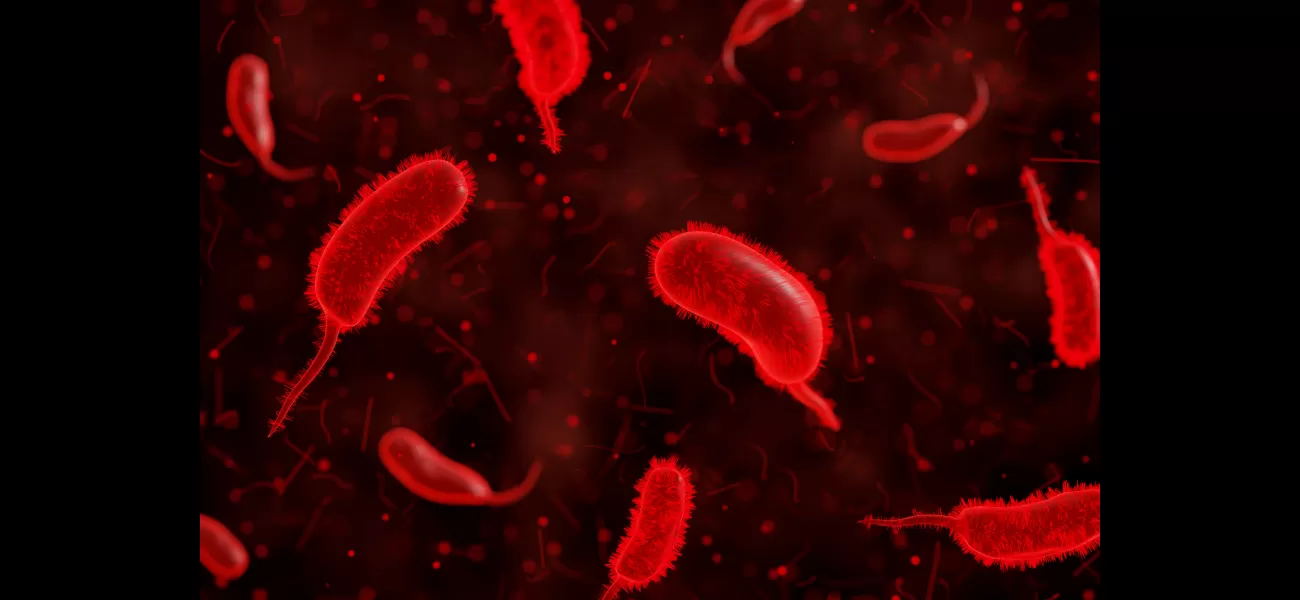Killer bacteria hunt and devour human blood.
What fantastic news!
April 17th 2024.

A recent study has revealed that bacteria can behave like vampires, seeking out human blood as their source of nourishment. This shocking discovery has been named 'bacterial vampirism' by the team of scientists from Washington State University who conducted the research. They have found that certain deadly bacteria, including E coli, have the ability to detect and swim towards human blood in order to feed on its nutritious contents.
The team, led by Professor Arden Baylink from the university's College of Veterinary Medicine, discovered that bacteria are irresistibly attracted to the liquid component of blood, known as serum, which contains essential nutrients for their survival. This groundbreaking research, published in the journal eLife, not only sheds light on how infections in the blood occur but also has potential implications for the development of more effective treatments.
According to Professor Baylink, bacterial infections in the bloodstream can be fatal. He explains, "We have learned that some of the bacteria responsible for the most common bloodstream infections have the ability to sense a chemical in human blood and move towards it." Along with E coli, other bacteria such as Salmonella enterica and Citrobacter koseri, which can cause serious illnesses like meningitis and brain abscesses, also exhibit this 'bacterial vampirism'.
These bacteria are particularly dangerous for people with inflammatory bowel disease (IBD), as the intestinal bleeding that accompanies this condition serves as an entry point for the bacteria into the bloodstream. This can lead to severe and potentially deadly infections. The team found that salmonella, in particular, has a specialized receptor that allows it to detect the presence of blood.
To observe this phenomenon, the researchers used a powerful microscope system and simulated intestinal bleeding by injecting tiny amounts of human serum. They observed that the bacteria quickly and efficiently moved towards the blood using a process called chemotaxis, which involves moving towards areas where a specific chemical is concentrated. They also noted that the bacteria were most drawn to a chemical called serine, which is commonly found in protein drinks.
Co-author Siena Glenn, who was involved in the study, explains the potential implications of this research, saying, "By understanding how these bacteria are able to detect blood sources, we can work towards developing new medications that can block this ability." This could greatly benefit people with IBD, who are at a higher risk of developing bloodstream infections.
The three types of bacteria studied - E coli, salmonella, and Citrobacter koseri - are all known to cause gastrointestinal illnesses like vomiting and diarrhoea. However, if they enter the bloodstream, they can cause a life-threatening condition called sepsis. This occurs when the immune system overreacts to an infection and starts attacking the body's own tissues and organs.
In conclusion, this study has provided valuable insight into the behavior of deadly bacteria and their ability to seek out human blood as a source of nourishment. By understanding this process, researchers can work towards developing effective treatments and potentially save lives.
The team, led by Professor Arden Baylink from the university's College of Veterinary Medicine, discovered that bacteria are irresistibly attracted to the liquid component of blood, known as serum, which contains essential nutrients for their survival. This groundbreaking research, published in the journal eLife, not only sheds light on how infections in the blood occur but also has potential implications for the development of more effective treatments.
According to Professor Baylink, bacterial infections in the bloodstream can be fatal. He explains, "We have learned that some of the bacteria responsible for the most common bloodstream infections have the ability to sense a chemical in human blood and move towards it." Along with E coli, other bacteria such as Salmonella enterica and Citrobacter koseri, which can cause serious illnesses like meningitis and brain abscesses, also exhibit this 'bacterial vampirism'.
These bacteria are particularly dangerous for people with inflammatory bowel disease (IBD), as the intestinal bleeding that accompanies this condition serves as an entry point for the bacteria into the bloodstream. This can lead to severe and potentially deadly infections. The team found that salmonella, in particular, has a specialized receptor that allows it to detect the presence of blood.
To observe this phenomenon, the researchers used a powerful microscope system and simulated intestinal bleeding by injecting tiny amounts of human serum. They observed that the bacteria quickly and efficiently moved towards the blood using a process called chemotaxis, which involves moving towards areas where a specific chemical is concentrated. They also noted that the bacteria were most drawn to a chemical called serine, which is commonly found in protein drinks.
Co-author Siena Glenn, who was involved in the study, explains the potential implications of this research, saying, "By understanding how these bacteria are able to detect blood sources, we can work towards developing new medications that can block this ability." This could greatly benefit people with IBD, who are at a higher risk of developing bloodstream infections.
The three types of bacteria studied - E coli, salmonella, and Citrobacter koseri - are all known to cause gastrointestinal illnesses like vomiting and diarrhoea. However, if they enter the bloodstream, they can cause a life-threatening condition called sepsis. This occurs when the immune system overreacts to an infection and starts attacking the body's own tissues and organs.
In conclusion, this study has provided valuable insight into the behavior of deadly bacteria and their ability to seek out human blood as a source of nourishment. By understanding this process, researchers can work towards developing effective treatments and potentially save lives.
[This article has been trending online recently and has been generated with AI. Your feed is customized.]
[Generative AI is experimental.]
0
0
Submit Comment





